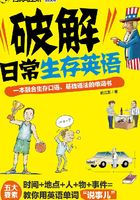
Season-6 Body Parts and Their Movements(身体部位和动作)
S6-1 Head (头部)

face [feɪs] n. 脸 v. 面对
【引】skin [skɪn] n. 皮,皮肤
【引】mask [mɑːsk] n. 口罩,面具
【例】You have to face the difficulties in life.你必须要面对生活中的困难。
body ['bɒdi] n. 身体
【固】body part 身体部位
head [hed] n. 头;首领
【例】Henry is the head of the company. 亨利是公司老板。
hair [heə(r)] n. 头发
【引】style [staɪl] n. 样式
【固】hair style 发型
brain [breɪn] n. 大脑
【引】memory ['meməri] n. 记忆,记忆力
【固】good/poor memory 好/坏记性
【引】memorize ['meməraɪz] vt. 记住
【生存句】
A: I can’t memorize this long English word. I have a poor memory.
(我记不住这个长英文单词。我的记性不好。)
B: You can divide it into parts. It’s easier to memorize it that way.
(你可以把它分成不同部分。这样记忆起来更简单。)
【注】divide [dɪ'vaɪd]=v. 分割
eye [aɪ] n. 眼睛
【引】see [siː] vt. 看,看到
【引】blind [blaɪnd] a. 瞎的, 盲的
【生存句】
A: Hello, doctor, I can’t see things clearly with my eyes. Is there a problem with my eyes?
(你好,医生,我的眼睛看不清东西。我的眼睛有问题吗?)
B: OK, let me see. Don’t worry. You just need more sleep.
(好的,我看一下。别担心。你只是需要多休息。)
nose [nəʊz] n. 鼻子
【引】smell [smel] v. 闻
ear [ɪə(r)] n. 耳朵
【引】hear [hɪə(r)] v. 听到(声音)
【引】deaf [def] a. 聋的
【引】sound [saʊnd] n. 声音
【引】noise [nɔɪz] n. 噪声;响声
【生存句】
A: I can’t smell anything with my nose.
(我的鼻子闻不到气味了。)
B: Maybe you have a cold. Why don’t you go see a doctor?
(也许你是感冒了。你为什么不去看看医生?)
【生存句】
A: Hey, listen to me. I can hear a clear sound coming from the kitchen. Can you hear it?
(嘿,听我说。我可以听到一个清晰的声音从厨房传过来。你可以听到吗?)
B: Of course. I'm not deaf. It’s just the noise our cat is making.
(当然。我不聋。那是我们的猫弄出的噪声。)
【注】clear [klɪə(r)]=a. 清晰的
S6-2 About the Mouth(关于嘴部)
mouth [maʊθ] n. 嘴
【引】spit [spɪt] v. 吐唾沫;吐痰
【引】breathe [briːð] v. 呼吸
【固】breathe in/out 吸进/呼出
【引】breath [breθ] n. 呼吸
【固】take a deep breath 深吸一口气
throat [θrəʊt] n. 嗓子,喉咙
【引】voice [vɔɪs] n. 说话声
【引】speak [spiːk] v. 讲话
【引】shout [ʃaʊt] vi. 喊叫
lip [lɪp] n. 嘴唇
【引】kiss [kɪs] vt./n. 吻
【固】give me a kiss 吻我一下
teeth [tiːθ] n. 牙齿(复数)
【引】tooth [tuːθ] n. 一颗牙齿
【引】toothbrush ['tuːθbrʌʃ] n. 牙刷
【引】toothpaste ['tuːθpeɪst] n. 牙膏
【引】bite [baɪt] vt. 咬
【引】chew [tʃuː] vt. 咀嚼
tongue [tʌŋ] n. 舌头
【引】lick [lɪk] v. 舔
【生存句】
A: I’m the next one to be interviewed. I’m so nervous right now. My voice is shaking.
(我是下一个接受面试的。我现在特别紧张。我的声音都在发抖。)
B: Just relax . You can try to take a deep breath. Breathe in a lot of fresh air and slowly breathe out. If that doesn’t help, you can just speak to me pretending I’m the head of this company.
(放松。你可以试试深呼吸。吸入很多新鲜空气,然后慢慢地呼出。如果那样没用,你可以假装我是这个公司的老板来和我说话。)

S6-3 Everything but the Head (非头部)
neck [nek] n. 脖子
【固】long neck 长脖子
waist [weɪst] n. 腰部
【引】belt [belt] n. 腰带
leg [leɡ] n. 腿
【引】stand [stænd] v.站
【引】sit [sɪt] vi. 坐
【引】walk [wɔːk] vi. 步行
【引】step [step] n. 脚步
【固】step by step 一步一步地
knee [niː] n. 膝盖
【引】bend [bend] vt. 使弯曲
【固】bend your knees 屈膝
arm [ɑːm] n. 手臂
【引】muscle ['mʌsl] n. 肌肉
【引】hug [hʌɡ] n./v. 拥抱
【生存句】
A: Honey, I will miss you. Have a good flight.
(亲爱的,我会想你的。希望你飞行愉快。)
B: I will miss you, too. Give me a hug.
(我也会想你的。拥抱一下。)
back [bæk] n. 后背
【引】lie [laɪ] vi. 躺,平躺
【例】Please lie down on your back. 请躺平。
foot [fʊt] n. 脚(单数)
【引】feet [fiːt] n. 脚(复数)
【固】on foot 步行
【引】kick [kɪk] vt. 踢
heart [hɑːt] n. 心脏
【固】in my heart 在我心中
【引】blood [blʌd] n. 血液

S6-4 Basic Hand Movements(手的基本动作)
hand [hænd] n. 手
【引】finger ['fɪŋɡə(r)] n. 手指
【引】fingerprint ['fɪŋɡəprɪnt] n. 指纹
【引】touch [tʌtʃ] vt. 触摸
hold [həʊld] vt. 握
【固】hold my hand 握住我的手
【生】Hold on!等一等!
fold [fəʊld] vt. 折叠
【固】fold a paper boat 叠一个纸船
rub [rʌb] vt. 搓
【固】rub your hands 搓你的手
【生存句】
A: Can I touch this with my hand?
(我可以用手摸吗?)
B: Sure, but don’t take photos. It’s not allowed.
(可以,但是不可以拍照。那是不允许的。)
pull [pʊl] vt. 拉
【固】pull back 拉回来
reach [riːtʃ] vt. 够到
【例】I can’t reach that book. The shelf is too high.我够不到那本书。架子太高了。
press [pres] vt. 按,压
【固】press this button 按这个按键
【引】pressure ['preʃə(r)] n. 压力
push [pʊʃ] vt. 推
【固】push sb. away 把某人推开
knock [nɒk] vt. 敲
【固】knock at the door 敲门
grab [ɡræb] vt. 紧抓
【固】grab my arm 紧抓我的手(臂)
catch [kætʃ] vt. 抓住
【固】catch up with... 赶上……
shake [ʃeɪk] vt. 使晃动
【固】shake hands 握手
tear [teə(r)] vt. 撕
【引】tore [tɔː(r)](tear 的过去式)
【固】tear down 撕下来
climb [klaɪm] v. 爬
【固】climb a tree 爬树
point [pɔɪnt] vt.(用手) 指
【固】point at sb./sth.(用手)指某人或某物
【生存句】
A: When your dad went to your room last night, why did you push him away?
(昨晚当你爸爸进你房间的时候,你为什么把他推开?)
B: He went to my room without knocking at the door. I pointed at him with my finger and said something bad. He got mad and tore down one of the posters on the wall. I said something even worse. Then he tried to grab my arm, so I pushed him away and ran out.
(他不敲门就进了我的房间。我用手指指着他说了一些不好听的话。他生气了,然后把我墙上的一张海报撕了下来。我又说了一些更难听的话。然后他想抓我的手臂,所以我推开他跑出去了。)
【注】poster ['pəʊstə(r)] = n. 海报

S6-5 Other Hand Movements(其他手部动作——相对间接)
dig [dɪɡ] vt. 挖
【固】dig a hole 挖一个洞
carry ['kæri] vt. 搬运
【固】carry on 继续
【固】carry-on baggage(带上飞机的)随身行李
put [pʊt] vt. 放
【固】put away (my books) 把(我的书)收起来放好
give [ɡɪv]vt. 给
【固】give away (my things) 把(我的东西)送人
pack [pæk] vt. 打包
【固】pack up 打包收好
【生存句】
A: Would you like to give away your old books?
(你会把你的旧书送人吗?)
B: No, I wouldn’t. I’ll pack them up and put them away.
(不,我不会。我会把他们打包然后放起来。)

break [breɪk] vt. 折断, 打破
【固】break a rule 打破规则
shut [ʃʌt] vt. 关(门窗等)
【固】shut the door 关门
hit [hɪt] vt. 打;撞
【引】hit [hɪt](过去式、过去分词)
【例】A car hit a tree.一辆汽车撞了一棵树。
beat [biːt] vt. 打,敲打
【固】beat sb. up 痛打某人
clean [kliːn] vt. 打扫
【固】clean up 打扫干净
【生存句】
A: What did you do today?
(你今天做了什么?)
B: I cleaned up my room today.
(我今天打扫了我的房间。)
wash [wɒʃ] vt. 洗
【固】wash away 洗掉
pour [pɔː(r)] vt. 倒
【固】pour some water 倒一些水
【生存句】
A: You just washed your car a few days ago. Why are you washing it again?
(你几天前刚洗的车。你为什么又在洗?)
B: Because I’m going to pick up an important friend at the airport today. Can you pour some more water into my bucket?
(因为我要去机场接一个重要的朋友。你能往我的桶里多倒点水吗?)